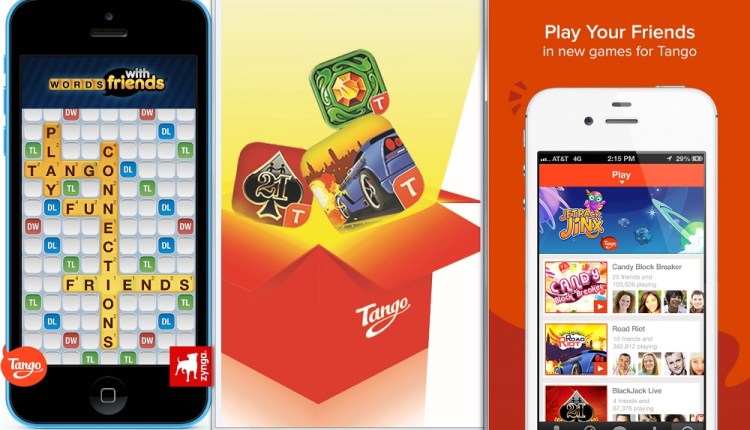Tango wants everyone to know it is serious about publishing mobile games on its platform. Today, this mobile messaging network (with 200 million users and growing) announced that it has hired mobile game veteran Jim Ying as vice president of games publishing and that it’s setting up a $25 million fund to invest in game developers around the world.
The moves show that Tango is serious about pursuing games as a strategy to differentiate itself from larger mobile messaging networks like Facebook’s WhatsApp, and it is following in the footsteps of fast-growing Asian mobile messaging networks like Kakao Talk, Line, and WeChat.
To compete on a global stage, Tango recently raised $280 million in funding in a round led by Chinese internet giant Alibaba. Now it is putting that money to work with the $25 million global games fund, which will seed developers with promising games for Tango’s network. Ying, formerly a publishing executive at Gree International (the U.S. division of Japan’s Gree), will join Tango as vice president of games publishing to launch the whole effort.
“No other messaging app has made a financial commitment of this magnitude,” Ying said. “The Tango Global Games Fund is unique in that it gives developers an amazing opportunity to leverage a leading messaging platform, as well as take advantage of our marketing efforts to launch top-tier games.”
Ying will start an in-house game development team and help Tango become a player in the global games market. Tango needs to convince game developers to publish great games on its platform, which can help them spread in a more viral fashion. Mobile messaging networks, which are replacing text messages and chat on smartphones, are particularly effective at spreading games in Asia because active users can easily share accomplishments or offer gifts on the networks with their friends.
Mobile messaging networks take a chunk of the money that comes in as part of a revenue sharing agreement, with maybe 20 percent or 30 percent of the take. That’s in addition to the 30 percent that mobile platform owners like Google or Apple take on app store purchases. So to justify publishing a game on a mobile messaging network, there has to be a big payoff for a third-party game developer.
In fact, if Tango can provide a lot more users to game developers, then those game companies don’t have to spend so much money on marketing. Kent Wakeford, chief operating officer at Kabam, made this point at our MobileBeat 2014 conference. He said that messaging networks can be attractive because Kabam can lower its own marketing budget for a game.
“Because it is on a revenue share basis, if we are not able to drive users for a partner, then we will not reap the benefits either,” Ying said.
Ying said that Tango is putting together an “attractive package” for revenue sharing. The exact percentage Tango takes depends on whether a game has been proven elsewhere before. Rather than limit distribution efforts to premier real estate within Tango, top-performing games will receive promotion through additional, off-platform marketing channels, the company said.
Investments and acquisitions of game teams will also be considered, Ying said.
Game developers who publish their games with Tango could reach the network’s 200 million members through native ads, chat notifications, Tango Channels, as well as being listed as a featured game.
“We think developers can benefit from Tango’s one-of-a-kind game distribution model,” said Tango CEO and founder Uri Raz. “First, we give developers access to our highly engaged member base: 70 percent of whom play mobile games. Secondly, we give them access to platform tools that allow them to increase vitality and retention on their games. On top of that, we will be putting our marketing muscle behind off-platform user acquisition.”
“This strategy is a winning combination for the developer community, and having Jim Ying join our executive team is certainly a win for Tango,” Raz said.
Eric Setton, the chief technology officer and founder of Mountain View, Calif.-based Tango, said in an interview that the network’s growth has doubled compared to a year ago.
“When the network effect kicks it, it’s very difficult to slow down,” Setton said. “As far as games go, the good news is we have more and more organic firepower. That’s great for developers. The interesting thing about this fund is it is the first of its kind for a mobile messaging service. We want to become a more modern game publisher. A typical publisher doesn’t have a central location that serves a vibrant community. A typical publisher has a brand, but we have a community.”
Ying previously managed a $10 million games fund for Gree as it expanded to the West from Japan. He also was a senior vice president of publishing at 6waves (a social-mobile games publisher), where he managed the product, marketing, and business development teams while overseeing the U.S. office.
Back in July 2013, Tango laid the foundation for its games strategy by launching a third-party software development kit, which includes applications programming interfaces (APIs) and social features such as leaderboards, Tango friend lists, gifting, and game invites. Stats show the APIs vastly improve engagement. Among the games Tango published was Zynga’s Words With Friends. It has more than 40 game partners already.
Games played by Tango members have up to two or three times the lifetime value (LTV) compared to the same games played by non-Tango members, Ying said. Ying will speak at 2 p.m. Wednesday at the Casual Connect San Francisco conference on a panel entitled “Messaging Apps: A New Frontier for Gaming Developers to Acquire and Engage Gamers.”
Setton started Tango in 2009, and it has had explosive growth in 224 countries. Its growth is about 325,000 per day, and it has 70 million monthly active users. About 40 percent of its users are on iOS and 60 percent are on Android. The company has raised $367 million to date, and it has 160 employees. Investors include MXB Holdings, WR Hambrecht, Long Sea Ltd., Draper Fisher Jurvetson, SPA special Investment Fund, AI SMS, Qualcomm Ventures, and Alibaba Group.
VentureBeat's mission is to be a digital town square for technical decision-makers to gain knowledge about transformative enterprise technology and transact. Learn More




